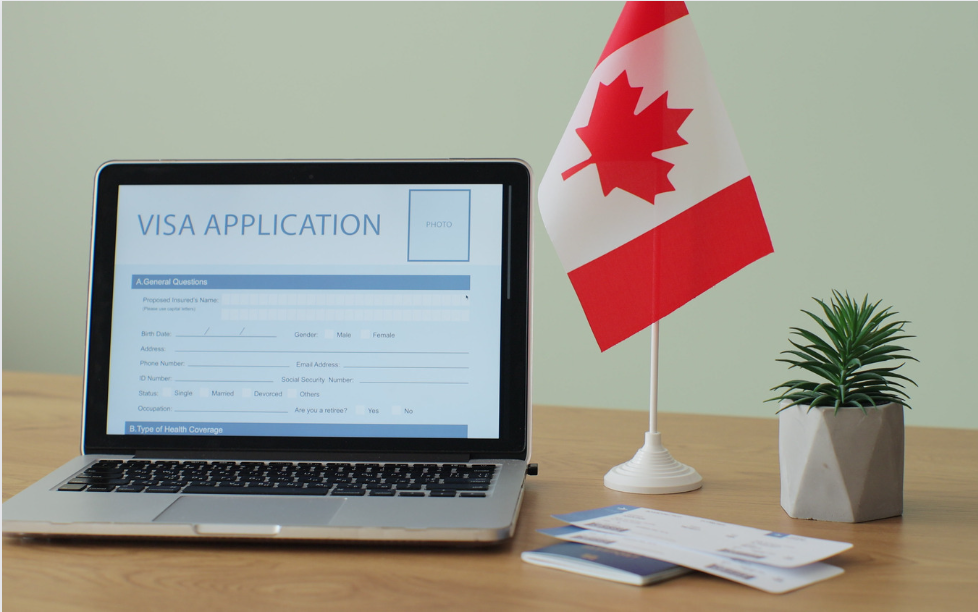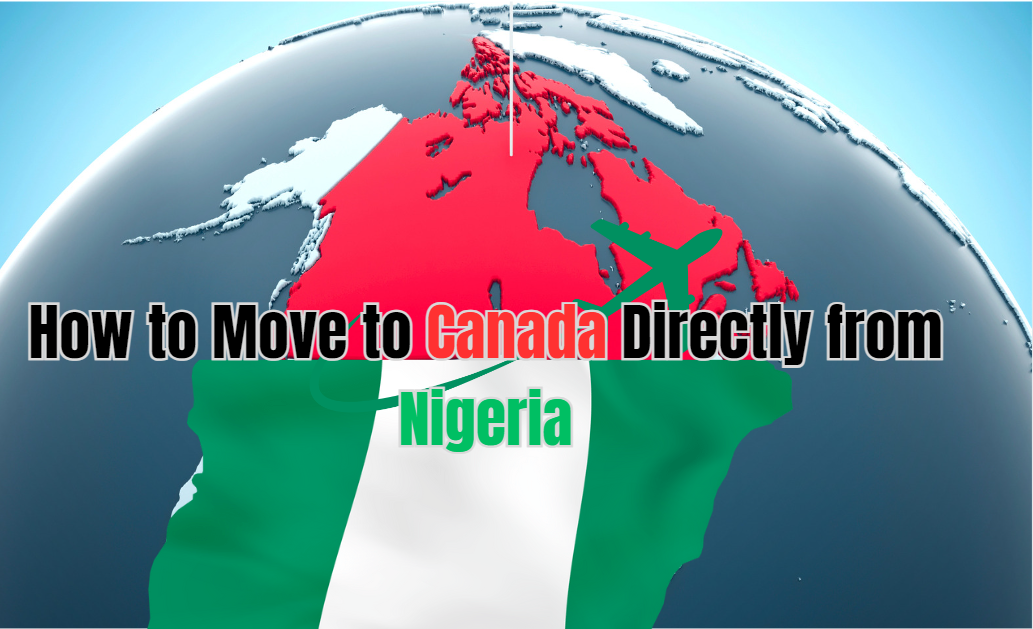Table of Contents
Canada has become a popular destination for Nigerians seeking a better life. With its diverse culture, welcoming atmosphere, and high standard of living, it’s no surprise that more Nigerians are choosing to call Canada their new home. In recent years, the number of immigrants moving from Nigeria to Canada has tripled, making Nigeria one of the main source countries for immigration in Canada.

To move to Canada directly from Nigeria, it’s essential to have a clear understanding of the various immigration options available, the necessary eligibility requirements, and the application process. Each year, over 20,000 Nigerians gain Canadian permanent residence, showing that it is indeed possible to make a successful transition with the right guidance and preparation.
Key Takeaways
- Numerous immigration options are available for Nigerians wishing to move to Canada
- Understanding the eligibility requirements and application processes is crucial for a successful move
- Proper preparation, language skills, and professional assistance can increase the chances of a smooth transition.
Understanding Immigration to Canada
Canada Immigration Levels Plan
Canada has a well-structured immigration plan known as the Canada Immigration Levels Plan, which sets the annual targets for new immigrants. This plan is managed by Immigration, Refugees and Citizenship Canada (IRCC) and aims to attract skilled workers, entrepreneurs, and family members of Canadian citizens.
We can help you understand the various immigration pathways, such as the popular Express Entry system, which is an online application management system for skilled workers. The Express Entry takes applications from three economic immigration programs, including the Federal Skilled Worker Program (FSWP), the Federal Skilled Trades Program (FSTP), and the Canadian Experience Class (CEC).
Canada Permanent Residence
Applying for Canada Permanent Residence (PR) requires a thorough assessment of your eligibility based on factors such as age, education, work experience, language proficiency, and adaptability. To begin the process, we recommend filling out the Canada Immigration Assessment Form to determine your potential for success.
Once you have assessed your eligibility, the next step involves creating an online Express Entry profile, which is subsequently ranked against other candidates using the Comprehensive Ranking System (CRS) scores. The top candidates receive an Invitation to Apply (ITA) for permanent residence.
In addition to Express Entry, there are other pathways to permanent residence such as:
- Provincial Nominee Programs (PNPs): Each Canadian province and territory has its unique immigration program aimed at addressing specific labor market needs. Eligible candidates can be nominated for PR by the province or territory.
- Family Sponsorship: Canadian citizens and PR holders can sponsor their eligible family members (spouses, parents, grandparents, children, etc.) to live in Canada as permanent residents.
Overall, understanding the Canadian immigration process is crucial for a successful journey to obtaining permanent residence. By familiarizing yourself with the various programs, requirements, and assessment methods, you increase your chances of achieving your goal of moving to Canada from Nigeria.
Eligibility and Application Process

Federal Skilled Worker Program (FSWP)
Under the Federal Skilled Worker Program (FSWP), potential immigrants must meet Canada’s immigration eligibility criteria, which include obtaining a minimum of 67 points based on:
- Education
- Language proficiency
- Work experience
- Age
- Arranged employment
- Adaptability
An Educational Credential Assessment (ECA) must be completed to determine the equivalence of a candidate’s educational qualifications to Canadian standards. In addition, applicants are evaluated using the Comprehensive Ranking System (CRS), which ranks candidates based on factors such as skills, education, and language proficiency.
Canada Immigration Document Checklist for FSWP:
- Passport
- Proof of work experience
- Language test results
- Educational Credential Assessment (ECA) report
- Police certificates
- Medical examination
- Proof of funds
Canadian Experience Class (CEC)
For candidates who have at least one year of skilled work experience in Canada, the Canadian Experience Class (CEC) offers another viable option. The same CRS is used to assess and rank candidates for this program as well, but with a focus on Canadian work experience.
Canada Immigration Document Checklist for CEC:
- Passport
- Proof of work experience in Canada
- Language test results
- Medical examination
- Police certificates
Provincial Nominee Program (PNP)
Provincial Nominee Programs (PNP) facilitate immigration for candidates with a specific interest in a particular province or territory. Each province has its own unique criteria, and applicants should research the programs in their desired province to understand the requirements and application process.
Canada Immigration Document Checklist for PNP:
- Passport
- Language test results
- Proof of work experience
- Educational Credential Assessment (ECA) report, if applicable
- Police certificates
- Medical examination
- Proof of funds
Overall, the key to a successful Canada immigration application is thorough preparation and attention to detail. By following the appropriate application guide and ensuring all documents are complete and accurate, candidates can maximize their chances of achieving their dream of immigrating to Canada from Nigeria.
Visas and Work Permits

Study Permit
A Study Permit is necessary for Nigerians who want to study in Canada. With reputable educational institutions, Canada is an attractive destination for students worldwide. After completing their studies, students can obtain a Post-Graduate Work Permit (PGWP) which allows them to work in Canada for a duration equal to their study permit, up to three years.
To apply for a Study Permit, you’ll need a letter of acceptance from a designated learning institution in Canada. The application process involves providing your passport, proof of financial support, and travel documents. You can submit the application online or in-person at the Canada Visa Application Centre (VAC) in Nigeria.
Temporary Resident Visa (TRV)
A Temporary Resident Visa (TRV) allows Nigerians to visit Canada for a short period of time. TRVs are granted for various purposes, such as tourism, business visits, or family visits. To obtain a TRV, you’ll need to submit your travel documents, proof of financial support, and proof that you’ll return to Nigeria after your visit. In some cases, parents and grandparents of Canadian citizens and permanent residents can apply for a Super Visa, which extends their stay in Canada up to two years.
Canada Work Permit
To work in Canada, Nigerians must first secure a job and have a valid Canada Work Permit. Numerous opportunities exist in Canada due to labor shortages resulting from an aging population. To apply for a work permit, you’ll need a job offer, travel documents, and proof of your eligibility to work in Canada.
Some occupations require a Labour Market Impact Assessment (LMIA), which is covered in the following subsection. Keep in mind that a work permit is different from a Temporary Work Visa, as it allows you to work and stay in Canada for an extended period.
Labour Market Impact Assessment (LMIA)
A Labour Market Impact Assessment (LMIA) is required for certain job offers from Canadian employers. This document ensures that there’s a genuine need for foreign workers in that particular occupation. Before applying for a Canada Work Visa, you should verify if your job offer requires an LMIA.
An LMIA is a crucial aspect of the work permit application process. It confirms that the employer has tried to recruit local talent before resorting to foreign workers. This endorsement helps protect the Canadian labor market while assisting eligible foreign workers in obtaining a work permit.
We hope this information has provided you with a clear understanding of the various visas and work permits necessary for Nigerians to move to Canada. Remember to consult relevant authorities and official websites for up-to-date, accurate information about application requirements and processes.
Pathways to Canadian Immigration
Express Entry
Express Entry is a popular and fast pathway for those seeking to immigrate to Canada from Nigeria. This system processes applications for people who wish to obtain Canadian permanent residence, and is comprised of three main programs: Canadian Experience Class (CEC), Federal Skilled Worker Program (FSWP), and Provincial Nominee Program (PNP).
The CEC targets candidates with skilled work experience in Canada, while the FSWP is designed for skilled workers with foreign work experience. To be eligible, candidates must meet certain educational, language, and work experience requirements. The PNP allows participating Canadian provinces and territories to nominate individuals who have the skills, education, and work experience to contribute to their specific economy.
Family Sponsorship
Another pathway to immigrate to Canada is through Family Sponsorship. Canadian citizens and permanent residents can sponsor their spouse, common-law partner, dependent child, or other eligible relative for Canadian permanent residence. The sponsored family member must meet certain requirements, such as medical, criminal, and financial checks, as well as submit application forms and supporting documents.
Canada Start-Up Visa Program
Entrepreneurs with innovative business ideas can consider the Canada Start-Up Visa Program as a way to secure their Canadian permanent residence. To qualify, applicants must have a qualifying business, sufficient funds, and a Letter of Support from a designated organization. This program aims to attract entrepreneurs who have the potential to build businesses that can create jobs, contribute to the Canadian economy, and compete on a global scale.
In conclusion, there are several pathways available to individuals looking to immigrate to Canada from Nigeria. By researching and considering programs like Express Entry, Family Sponsorship, and the Canada Start-Up Visa Program, hopeful immigrants can select the best option suited for their unique situation.
Language and Integration
Canadian Language Benchmarks (CLB)
When moving to Canada from Nigeria, it’s essential to be proficient in at least one of the official languages: English or French. The Canadian government uses the Canadian Language Benchmarks (CLB) to evaluate language proficiency. The CLB is divided into 12 levels, with Level 1 being basic and Level 12 being advanced.
Here’s a simplified breakdown of the CLB levels:
- Levels 1-4: Basic knowledge, able to communicate in familiar situations.
- Levels 5-8: Intermediate knowledge, able to handle moderately difficult situations.
- Levels 9-12: Advanced knowledge, able to fluently communicate in complex situations.
It’s important to undergo an Educational Credential Assessment (ECA) if you have completed education outside of Canada. This evaluation compares your educational credentials with Canadian standards and helps determine your eligibility for various immigration programs. You may complete your ECA through organizations such as World Education Services or International Credential Assessment Service of Canada.
Canada Immigration Language Test Requirement
To apply for permanent residency or some Canadian immigration programs, you need to take an approved language test that evaluates your proficiency in English or French. The test results must be submitted along with your immigration application. Here’s a list of approved language tests for each official language:
English:
- IELTS (International English Language Testing System)
- CELPIP (Canadian English Language Proficiency Index Program)
French:
- TEF Canada (Test d’évaluation de français)
- TCF Canada (Test de connaissance du français)
Each language test evaluates four skill areas: listening, speaking, reading, and writing. The minimum CLB level required depends on the immigration program you apply for. For example, the Express Entry system typically requires a minimum CLB level of 7 for the Federal Skilled Worker Program.
In conclusion, understanding and meeting the language requirements for immigrating to Canada is crucial. By familiarizing yourself with the Canadian Language Benchmarks and preparing for the necessary language tests, you’ll be one step closer to completing the immigration process and integrating into Canadian society.
Legal and Professional Assistance
Canada Immigration Legal Representation
The process of immigrating to Canada can be complex and challenging, but having an experienced legal representative can greatly increase your chances of a successful and stress-free immigration experience. By engaging a Canada Immigration Legal Representation, you’ll benefit from expert guidance on the immigration process, ensuring that all necessary documents are submitted correctly and in a timely manner. Moreover, they can help you navigate the various immigration programs and pathways, such as the Federal Skilled Worker Program (FSWP) and the Provincial Nominee Program (PNP).
Canada Immigration Advice Package
If you’re seeking comprehensive information and guidance on how to move to Canada from Nigeria, consider a Canada Immigration Advice Package. This service typically includes resources that cover key aspects of immigration, such as:
- Explanation of different immigration programs and categories
- Step-by-step guidance on the application process
- Tips on improving your eligibility and application
- Timelines and required documentation
- Assistance with forms and paperwork
- Preparing for language proficiency tests and required certifications
- Guidance on settlement, employment, and education in Canada
By choosing a Canada Immigration Advice Package, you’ll receive tailored assistance that addresses your specific needs and situation.
Canada Immigration Consultation
One of the useful starting points for individuals exploring immigration to Canada from Nigeria is a Canada Immigration Consultation. These consultations generally include:
- Assessment of your eligibility for various immigration programs
- Detailed explanation of the application process and requirements
- Professional advice on improving your chances of approval
- Personalized suggestions on settlement, employment, and education in Canada
Make sure to choose a Canada Immigration Consultancy with a proven track record and expertise in assisting Nigerian applicants. This ensures that you receive accurate, up-to-date guidance on your journey to Canada.
In summary, obtaining legal and professional assistance from Canada Immigration Application Assistance providers can effectively guide Nigerian applicants through the complex process of immigrating to Canada, offering valuable insights and support every step of the way.
RELATED: How to Move to Canada Without IELTS: A Comprehensive Guide
After Application Submission
Biometrics
Once you have submitted your application for immigration to Canada from Nigeria, you will need to provide your biometrics, which includes fingerprints and a photograph. This is a crucial step in processing your application, as it helps Canadian authorities verify your identity and ensure the safety and security of their citizens. You can provide your biometrics at the nearest visa application center or designated application support center near you. There may be additional fees associated with this process, so be prepared for that expense.
Immigration Medical Examination
A critical part of the immigration process is undergoing an Immigration Medical Examination (IME). Every applicant, regardless of age, must complete this examination to determine their health status and ensure they do not pose a risk to public health in Canada. A list of authorized panel physicians in Nigeria, who can perform the IME, is available on the official Canadian government website. Remember that the results of the medical examination are only valid for 12 months, and you should plan accordingly.
Canada Immigration Application Tracking
After submitting your application and providing biometrics, it is essential to track the progress of your immigration application. You can check the status of your application online through the Canada Immigration Application Status service. Keep in mind that processing times for immigration applications vary depending on factors such as the type of program and the volume of applications received.
While waiting for your application approval, make sure to keep your contact information up to date with the Canadian authorities. If you need to update your application or provide additional information, be prompt to do so and stay proactive. Remember that applications may sometimes be refused for various reasons, but there is an appeal process in place to review decisions and address any concerns.
We hope this information helps you understand the steps involved after submitting your application for immigration to Canada from Nigeria. Stay confident, organized, and diligent throughout the process, and you’ll be one step closer to starting your new life in Canada.
Disclaimer:
This article is for informational purposes only and not financial advice. Please do your own research or consult a professional before making financial decisions. The writer and publisher bear no responsibility for any potential losses or damages. Any reliance you place on information from canadaeasily.com is strictly at your own risk. Please read our Terms of Service for more information.





Pingback: The Ultimate Guide to Immigrate from South Africa to Canada: Step-by-Step Process and Advice - CanadaEasily